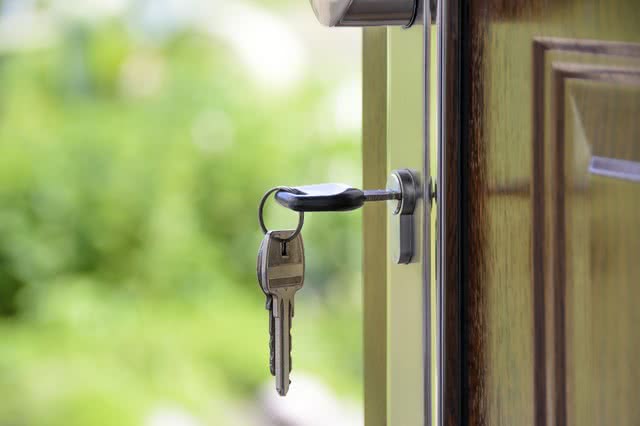
Updated May 2023.
When making the decision to leave your property unoccupied for any period of time, homeowners should also consider the potential risks of an unoccupied house. After all, the lack of a physical presence at a property makes it a far more likely target for thieves, vandals, and squatters.
There are a number of effective security measures that can be implemented to improve the safety of an unoccupied house, which we have outlined below. These measures should also be considered in terms of your own situation, where some options may or may not work for your particular building.
1. Motion Sensor Lights
One simple method of drawing attention to unwanted activity on your property is to install motion sensor lights – you will need to let your neighbours know this has been done, so they know to raise the alarm if the motion sensor lights suddenly switch on.
For the best protection, motion sensor lights should be positioned on all sides of the property, ensuring there is no interference with any security cameras on the property.
2. Minimum Security Requirements
Sometimes, the most traditional measures can provide the highest level of security. Most insurers require a minimum level of security such as:
– External Doors – 5 Lever mortice deadlocks.
– Patio doors – Key operated bolts to top and bottom opening sections, in addition to a central locking device.
– Windows – Key operated security locks to all ground floor and other accessible windows.
If this is not met, your property would not be covered for any damage arising from burglary, theft or attempted theft.
An installed alarm onsite would generally override any minimum security requirements, but make sure to check with your insurance provider first – don’t assume that this will automatically apply.
3. Physical Presence
Appointing a trusted person to visit the property at least once a week vastly improves the security of an unoccupied house. This allows you to check for any evidence of attempted entries, like marks on the doors or broken windows, and can also work to prevent trespassers. After all, frequent visits at different points of the day can prevent anyone scouting your home for a burglary from feeling secure enough to attempt entry. For these reasons, having your property checked regularly is a requirement of most unoccupied house insurance policies.
4. Timers for the lights
Installing a timer for your lights, or smart lights, is an easy way to ensure your property appears occupied. These timers are discrete and easily installed over your light sockets, with no wiring required. Once they’re set up, they then turn your lights on at pre-set times in the day, deterring trespassers who wait until your house appears unoccupied.
5. Alarm System
Installing an alarm system is one of the most important steps you can take to protect your property – which is why they’re actually a common requirement when shopping for unoccupied house insurance. House alarms don’t just alert the authorities to break-ins, they can actually work to deter crimes in the first place – after all, the majority of burglars will try to determine if there’s an alarm installed before attempting entry, and do their best to avoid homes with security systems in place.
For greater security, make sure you choose a system that automatically sends an alert to you, any local key holders, and the authorities if the alarm goes off.
6. Monitored Security Cameras
The mere presence of a security camera can help to protect an unoccupied home. Install both visible and hidden security cameras to ensure that even if a thief plans a break-in around the positions of visible cameras, they are still caught on camera. Even if someone is bold enough to take the risk, having the cameras monitored means action can be quickly taken to protect your home and its contents. Your security cameras can be monitored remotely 24/7 by a security firm or of course, you could check in on the property yourself on your laptop or smartphone.
Read our previous blog posts for more great tips and information regarding protecting your unoccupied home. For expert advice and assistance with insuring an unoccupied house, feel free to contact our expert team.